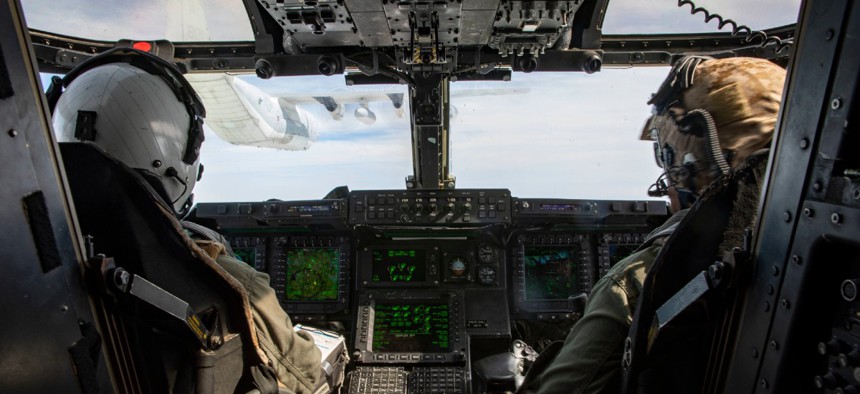Marine Corps Looks to Virtual Reality as a Recruitment Tool

A MV-22B Osprey with Medium Tiltrotor Squadron VMM-263 prepares to receive fuel from a KC-130J Super Hercules from Marine Aerial Refueler Transportation Squadron 252 over the Atlantic Feb. 12, 2020. Antonio Garcia/Marine Corps
It’s the first time the Marine Corps Recruiting Command ever explored procuring VR flight simulators on an enterprise level.
Future recruits of the Marine Corps Flight Officer Program—including people who’ve never considered such a career path before—could soon gain a cutting-edge, front-seat view of what the aviation jobs would entail, through virtual reality.
According to a request for information launched this week, the Marine Corps Recruiting Command, or MCRC, wants to “create a highly-portable virtual reality simulator” to support its recruitment of aviation officer candidates in regions across the United States. It’s in some ways an effort to entice more digital natives to join.
“The Marine Corps recognizes that today's college students are immersed in technology from a young age. They are looking for interactions at career fairs and expos that stand out from the typical static displays or those with graphics displayed on traditional monitors,” Gunnery Sgt. Justin Kronenberg, MCRC’s communication strategy chief, told Nextgov Friday. “We are interested in bringing an even more realistic experience to these engagements so we can show potential future aviators all of the options on offer.”
According to the solicitation and Kronenberg, MCRC recruitment officials have been using portable flight simulator systems as part of the Marine Corps Flight Orientation Program for several years. To date, those in use have adequately provided potential candidates with realistic simulations and spearheaded strong connections between recruits and recruiting teams. But the reliability of the bulky systems, which include four-panel LCD-type screens on a platform that moves around, “has been greatly diminished” over time. And since they were procured, display technology has become considerably advanced and miniaturized, which motivated the service to improve its tools, Kronenberg said. He added that the present systems do not have head-mounted VR capabilities.
“So… this is the first time we have explored procuring virtual reality flight simulators on an enterprise level for the Marine Corps Recruiting Command,” Kronenberg said. “This request for information is the initial stage in gathering input from the engineering, development and manufacturing sectors to assess the feasibility of improving the features, reducing the environmental impact and increasing the portability of such a system.”
The RFI prompts interested entities to respond with descriptions of their relevant VR solutions by Feb. 28. The MCRC is looking to purchase, lease or partner up to gain access to a system that has open-source VR-compatible scenery, offers content creation of realistic on-the-job scenarios such as low-level canyon flight and aerial refueling, is constructed of off-the-shelf hardware that has follow-on upgrades and replacement parts, and is portable enough to fit in a standard 15 passenger van and be lifted by no more than two people at a time.
“We are only in the information gathering stage at this point, but we envision this type of system could be used to inspire young men and women who may not have considered aviation as a career or the Marine Corps as their path,” Kronenberg said.






